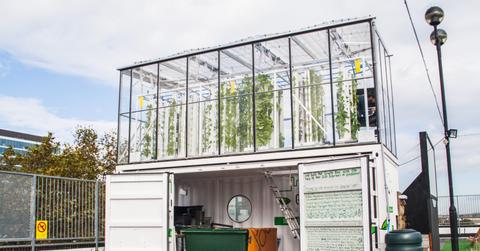Startup Brings Aquaponics To Urban Farmers In The UK
The GrowUp Box is a sustainable urban farm housed in a shipping container that uses vertical growing and aquaponics, a recirculating system that combines hydroponics and aquaculture, to create an efficient closed-loop farming system.
Updated May 21 2019, 4:40 p.m. ET
It's been said that urban farming is the most important environmental movement of our time. Commercial agriculture accounts for 30 percent of greenhouse gas emissions through petroleum-based fertilizers and transporting food across the country and the world, not to mention accounting for 70 percent of freshwater use and half of all useful land on Earth.
The vastly popular monocropping depletes the soil, and pesticides kill wildlife and harm human health. But commercial agriculture is the way it is for a reason: As cities grow and suburbs sprawl, there is less land available to grow diverse, organic and local crops to serve the urban populations. So farms move far away, and food gets shipped in.
Small, modest urban farms can help ease these pain-points. And while you know all about rooftop gardens and edible lawns, you've likely never seen anything like the GrowUp Box. From the startup GrowUp Urban Farms, the GrowUp Box is a sustainable urban farm housed in a shipping container that uses vertical growing and aquaponics, a recirculating system that combines hydroponics (growing plants in a nutrient solution without soil) and aquaculture (fish farming) to create an efficient closed-loop farming system.
Essentially, the aquaponic system consists of nothing more than bacteria, fish, water, and plants that work in tandem to sustain one another with little waste. There are no pesticides, soil, or synthetic fertilizers, so crops produced by aquaponics are even more sustainable. The way it works is pretty straight forward: the base of the shipping container houses a tank full of around 150 fish (they've experimented with both tilapia and carp), while a greenhouse lives above.
The water from the fish tank is sent to the roots of the plants growing in the greenhouse, where the micro-bacteria from the fish fecal matter fertilize the plants. In turn, the plants purify the water and it gets sent back down to the tank in a continuous cycle. The water is conserved and recycled, and the plants get all the nutrients they need.
The first GrowUp Box sits on top of an old shopping center in Stratford, London, where it produces around 550lbs of fish and 880lbs of greens and herbs for local restaurants a year. And while this mini urban farm serves a commercial purpose, it is also the site of workshops and tours offered to the public as educational opportunities.
“We didn’t just want to be people talking about urban farming, we wanted to be actually doing it and able to engage people in that," GrowUp Urban Farms co-founder Kate Hofman told The Guardian. "But even more important than communication and engagement was to have something that we could actually start selling. Because restaurants and chefs don’t want to talk to you about some food you might potentially be able to grow. They want to taste it.”
